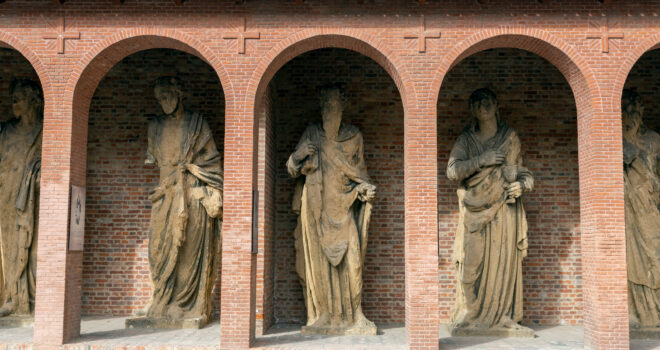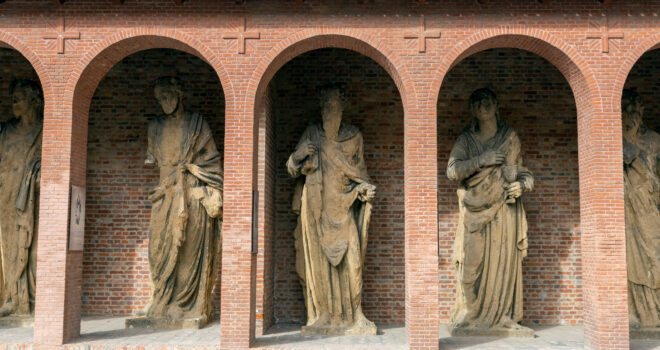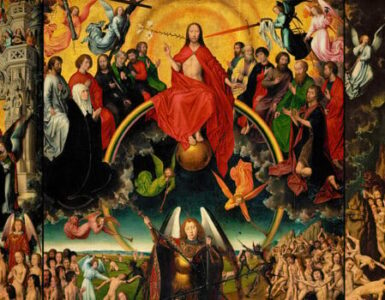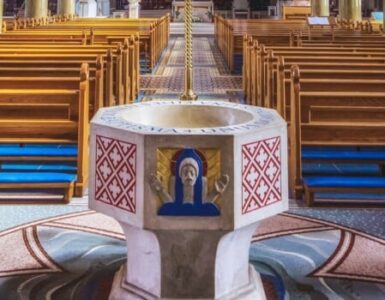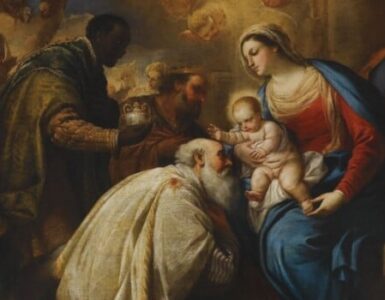The room is dark and musty. It smells ancient. Pillared arches loom like backs bent double. In the total silence, the flashlight darts over walls of glinting mosaic tiles, laid by skillful hands in the days of the Roman emperors.
The wandering flashlight beam fixes on the depiction of a vast, hunch-backed wolf sheltering two human babies, the whole scene colored gold. The mosaic depicts the legend of Romulus and Remus – brothers raised by a wolf, and who would raise up what would become the mighty Roman empire.
The ancient peoples loved a good myth. Not much has changed. From King Arthur to Captain America, people everywhere and at all times are drawn to legends for inspiration and direction.
The problem is, as good as legends can be, you eventually get tired of them. Deep down, people want something real.
The fascinating thing is that our myths and stories can be roads to the truth.
Referring to ancient myths, Catholic writer G.K. Chesterton stated in The Everlasting Man, “What are here called the Gods might almost alternatively be called the Day-Dreams. To compare them to dreams is not to deny that dreams can come true. To compare them to travellers’ [sic.] tales is not to deny that they may be true tales, or at least truthful tales.”
In other words, myths, although fictional, can contain sparks of truth. George Washington chopping down the cherry tree might not have actually occurred, but it’s a lesson not only in honesty for individuals, but also in the caliber of honesty American leaders were expected to aspire to.
Even more profoundly, as Chesterton explains in The Everlasting Man, God chooses to use human myths to powerfully communicate the truth.
As we celebrate the Solemnity of Sts. Peter and Paul, let’s look at three lessons on how God uses storytelling in the past and the present, and what that means for writers!
Lesson #1: Take it from Peter and Paul – you don’t have to be perfect, you just have to be
The Catholic Church, founded by Jesus Christ, blazed throughout the world because faithful disciples refused to be silent about the truth. Two followers that accepted God’s call to be leaders in the Church were St. Peter, the first pope, and St. Paul, the prolific writer and missionary.
This is not to say that Peter and Paul were perfect. They were regular people with dreams, good traits, and faults.
Jesus designated Simon Peter to be the first pope, as documented in Matthew 16:18-19. Also, in a moment of weakness, Peter repudiated any connection with Jesus during His passion, failing to stand beside his friend and God.
Paul of Tarsus was smart, educated, and had a way with the written word. Also, at one time, he thought he deserved a pat on the back from God for aiding in the killing of Christians, until a vision from God literally got him off his high horse.
The point is, Peter and Paul had serious failings, but what matters is that they didn’t give up. Because they chose to pick themselves back up, seek forgiveness, and surrender control of their lives to God, they accomplished incredible things and did so much good in the world.
Peter was given the wisdom and courage to be the first pope, even though that meant being in and out of jail, living in hiding, and dying a martyr.
The biggest portion of the New Testament was penned by Paul, whose words converted Jews and Gentiles alike and continue to inspire Christians today to give their best for God and to get to know Him better. While ministering throughout Asia and Europe, Paul was bitten by a poisonous snake, imprisoned, shipwrecked, stoned, and died a martyr’s death like Peter.
The way that Peter and Paul courageously faced suffering inspired many others in the early Church to do the same for the sake of Christ. Peter and Paul collaborated together – sometimes having to work through disagreements, as brothers often do – and brought others to Jesus.
Lesson #2: How the myth of Romulus and Remus conveys truths about the mission of Peter and Paul
Remember the story of Romulus and Remus? According to historian and writer Phillip Campbell, the early Christians compared brothers-in-Christ Peter and Paul to these legendary Roman brothers.
“The double-founding of the Church of Rome by the ‘twin’ apostles Peter and Paul must have undoubtedly called to mind the physical founding of Rome by the brothers Romulus and Remus, implying that the new, spiritual Rome was destined to inherit the glory of the physical Rome,” Campbell stated.
The familiar story of Romulus and Remus became for the early Christians a kind of foreshadowing of a real – and much greater – glory. Romulus and Remus were familiar characters to the people of that day, and a lens through which early Christians could understand their present situation.
Lesson #3: How storytelling, culture, and artists collaborate for the truth
How does this all come together?
Authors and stories might be as imperfect as the Roman empire. Peter and Paul weren’t perfect. They were saints, and that’s a whole different thing. “A saint is a sinner who keeps trying,” as St. Josemaría Escrivá said.
And yet, God takes into account our human stories and uses them in His greater plan. Comparing the story of Romulus and Remus to the real stories of Peter and Paul made the Church and Christ accessible and understandable to ancient cultures.
Our job as writers is to bring Christ to our contemporary culture through our stories. You don’t have to be the perfect writer – you just have to write.
I experienced this myself with one article I wrote. I was struggling with writing the article, so I finally plopped myself down in the Adoration chapel, asked Jesus for guidance, and wrote a good portion of the piece right then and there.
Still unsatisfied with the piece, I nevertheless put it out there. I was shocked at the reception the article received. Numerous people, some of which I didn’t even know, told me how relevant the article was to their lives, and how it inspired them to seek a closer relationship to God.
I was stunned. I hadn’t thought the article was that good. The truth is that it didn’t need to be up to my standards of “perfection” for God to use it to help others.
The stories that we write can be strictly fact-based, as in journalism, or they can be fictional creations. Either way, our stories can lead people to the Truth: God.
Let’s ask St. Peter, patron saint of fisherman, and St. Paul, patron saint of writers, to inspire our words for the glory of God.
Acknowledgements: A big thank-you to Phillip Campbell for his willingness to contribute his historical expertise.
Image by skovalsky on Shutterstock


